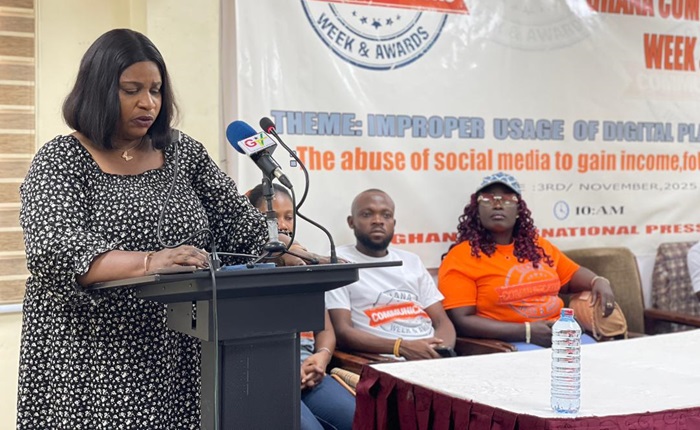Vice President of the Ghana Journalists Association (GJA), Ms Rebecca Ekpe, has called on Ghanaians, particularly the youth, to use digital platforms responsibly as part of efforts to rebuild public trust and strengthen democratic governance.
She said while social media had become a powerful tool for communication and creativity, its misuse through false information, online harassment, and the pursuit of fame was weakening public confidence in credible institutions and distorting national conversations.
Speaking at the launch of the Ghana Communications Week and Awards (GCWA) at the Ghana International Press Centre in Accra on Monday, November 3, 2025, Ms Ekpe urged citizens to use digital tools “to build, not to destroy,” stressing that every online post or share carries social consequences.
She encouraged young people to treat social media as a space for learning, professional networking, and creative expression rather than a platform for misinformation or abuse.
“Let us use these platforms to promote positive change, amplify marginalised voices, and drive social progress,” she said.
Ms Ekpe warned that misinformation and propaganda circulating online were “eroding trust in our institutions and manipulating public opinion.” She said false information often spreads
“four to six times faster than the truth,” adding that this trend threatens democratic accountability by making citizens doubt even credible sources of information.
Quoting Nobel Peace laureate Maria Ressa, she said the global fight against misinformation had become “a war against humanity,” and urged Ghanaians to help protect information integrity through responsible online behaviour.
Ms Ekpe also raised concern about cyberbullying and artificial intelligence–facilitated gender-based violence, which she said was increasingly being used to silence women journalists. “When you silence one woman journalist online, it is like silencing a thousand voices,” she said.
She called for stronger digital literacy campaigns and encouraged the public to practise what she described as “digital citizenship”, respecting others’ rights online, verifying facts before sharing information, and reporting harassment or false content to platform administrators. She reminded Ghanaians that publishing or circulating false news is an offence under national law.
Chief Executive Officer of Unique Media Production, Ms Sandra Daniella Yeboah, said the Ghana Communications Week and Awards was established to celebrate communication as a tool for national development and to recognise individuals and organisations using it to advance social progress.
She said the week-long initiative aims to empower communication professionals and institutions to use their expertise to shape national dialogue positively and strengthen Ghana’s democratic culture.
“This initiative seeks to honour role models who have made a positive impact on society through innovative and sustainable communication practices,” Ms Yeboah said.
She added that the maiden edition of the Ghana Communications Week and Awards marks the beginning of an annual platform that will bring together communication experts, media practitioners, and development partners to share ideas and inspire action towards a more responsible and forward-looking media landscape.
Ms Yeboah encouraged participants to “engage actively, exchange ideas, and make the most of every opportunity to learn and connect,” describing the event as a milestone in Ghana’s communication and media development journey.
The launch brought together journalists, communication professionals, students, and development advocates to discuss responsible digital engagement under the theme “Improper Usage of Digital Platforms in Ghana: The Abuse of Social Media to Gain Income, Followers and Popularity.”

